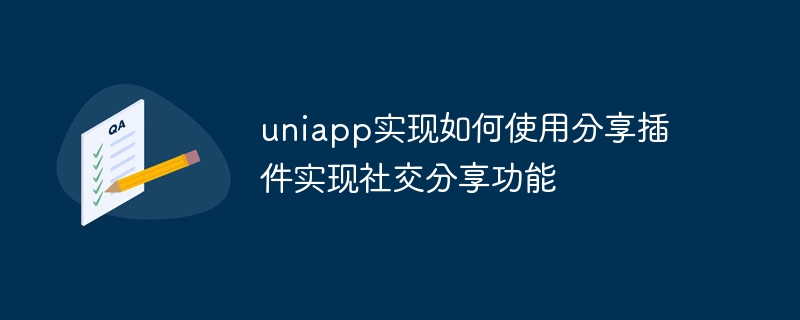 Web Front-end
Web Front-end
 uni-app
uni-app
 uniapp implements how to use sharing plug-ins to implement social sharing functions
uniapp implements how to use sharing plug-ins to implement social sharing functions
uniapp implements how to use sharing plug-ins to implement social sharing functions

Uniapp is a very powerful cross-platform development framework that can achieve the effect of writing once and running on multiple terminals. The social sharing function is one of the very common requirements in mobile application development. Uniapp provides a wealth of plug-ins to implement the social sharing function. This article will introduce how to use Uniapp's sharing plug-in to implement social sharing functions, and give specific code examples.
1. Selection of sharing plug-ins
Uniapp provides multiple sharing plug-ins for developers to choose from, among which the more commonly used ones are uni-share and uni-app-plus/share. Both plugins have their own advantages and features, so choose based on your project's needs and personal preferences.
2. Install the sharing plug-in
To use the sharing plug-in in the Uniapp project, you first need to run the following command in the terminal of HBuilderX or VS Code in the project root directory to install the plug-in:
npm install uni-share
or
npm install @dcloudio/uni-app-plus-share
After the installation is complete, register it in the manifest.json file of the project Plug-in, examples are as follows:
{
"manifest": {
"name": "uni-app",
"version": "1.0.0",
"description": "uni-app",
"appid": "uni-app",
"plugins": {
"uni-share": {
"version": "1.0.0",
"provider": "uni-app",
"path": "plugins/uni-share"
}
}}
}
3. Use the sharing plug-in
Install and register After sharing the plug-in, you can use the sharing function in the Uniapp project. The following is a simple sample code:
<view class="share-btn" @click="onShareClick">点击分享</view>

Hot AI Tools

Undresser.AI Undress
AI-powered app for creating realistic nude photos

AI Clothes Remover
Online AI tool for removing clothes from photos.

Undress AI Tool
Undress images for free

Clothoff.io
AI clothes remover

AI Hentai Generator
Generate AI Hentai for free.

Hot Article

Hot Tools

Notepad++7.3.1
Easy-to-use and free code editor

SublimeText3 Chinese version
Chinese version, very easy to use

Zend Studio 13.0.1
Powerful PHP integrated development environment

Dreamweaver CS6
Visual web development tools

SublimeText3 Mac version
God-level code editing software (SublimeText3)

Hot Topics
 How do I handle local storage in uni-app?
Mar 11, 2025 pm 07:12 PM
How do I handle local storage in uni-app?
Mar 11, 2025 pm 07:12 PM
This article details uni-app's local storage APIs (uni.setStorageSync(), uni.getStorageSync(), and their async counterparts), emphasizing best practices like using descriptive keys, limiting data size, and handling JSON parsing. It stresses that lo
 How do I manage state in uni-app using Vuex or Pinia?
Mar 11, 2025 pm 07:08 PM
How do I manage state in uni-app using Vuex or Pinia?
Mar 11, 2025 pm 07:08 PM
This article compares Vuex and Pinia for state management in uni-app. It details their features, implementation, and best practices, highlighting Pinia's simplicity versus Vuex's structure. The choice depends on project complexity, with Pinia suita
 How do I make API requests and handle data in uni-app?
Mar 11, 2025 pm 07:09 PM
How do I make API requests and handle data in uni-app?
Mar 11, 2025 pm 07:09 PM
This article details making and securing API requests within uni-app using uni.request or Axios. It covers handling JSON responses, best security practices (HTTPS, authentication, input validation), troubleshooting failures (network issues, CORS, s
 How do I use uni-app's geolocation APIs?
Mar 11, 2025 pm 07:14 PM
How do I use uni-app's geolocation APIs?
Mar 11, 2025 pm 07:14 PM
This article details uni-app's geolocation APIs, focusing on uni.getLocation(). It addresses common pitfalls like incorrect coordinate systems (gcj02 vs. wgs84) and permission issues. Improving location accuracy via averaging readings and handling
 How do I use uni-app's social sharing APIs?
Mar 13, 2025 pm 06:30 PM
How do I use uni-app's social sharing APIs?
Mar 13, 2025 pm 06:30 PM
The article details how to integrate social sharing into uni-app projects using uni.share API, covering setup, configuration, and testing across platforms like WeChat and Weibo.
 How do I use uni-app's easycom feature for automatic component registration?
Mar 11, 2025 pm 07:11 PM
How do I use uni-app's easycom feature for automatic component registration?
Mar 11, 2025 pm 07:11 PM
This article explains uni-app's easycom feature, automating component registration. It details configuration, including autoscan and custom component mapping, highlighting benefits like reduced boilerplate, improved speed, and enhanced readability.
 How do I use preprocessors (Sass, Less) with uni-app?
Mar 18, 2025 pm 12:20 PM
How do I use preprocessors (Sass, Less) with uni-app?
Mar 18, 2025 pm 12:20 PM
Article discusses using Sass and Less preprocessors in uni-app, detailing setup, benefits, and dual usage. Main focus is on configuration and advantages.[159 characters]
 How do I use uni-app's uni.request API for making HTTP requests?
Mar 11, 2025 pm 07:13 PM
How do I use uni-app's uni.request API for making HTTP requests?
Mar 11, 2025 pm 07:13 PM
This article details uni.request API in uni-app for making HTTP requests. It covers basic usage, advanced options (methods, headers, data types), robust error handling techniques (fail callbacks, status code checks), and integration with authenticat





